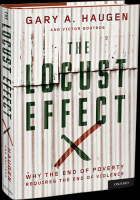 The Locust Effect by Gary A. Huagen and Victor Boutros (Oxford University Press, 2014)
The Locust Effect by Gary A. Huagen and Victor Boutros (Oxford University Press, 2014)
First world problems, even for the poor, really are different from those of the developing world. That doesn't mean they're not problems; dearth and excess are both damaging. Think starvation versus industrialized food and an obesity crisis; no schools versus an educational system with a stranglehold on our lives; lack of basic medical care versus a health care machine that takes birth and death away from home and makes us dependent on drugs.
We also have a hyperactive legal system that shackles our lives and has taken common sense out of the rule of law. The developing world? Rampant, violent crime and a legal system that protects the perpetrators and victimizes the victims.
Nearly fifty sticky-notes festoon my borrowed copy of The Locust Effect, but I don't have time to type them out. I could wait, but I'll never have time to do justice to the book—or more importantly, to its ideas. So I'm going to take the easy way out and suggest, strongly, that you check out the websites of The Locust Effect and of the International Justice Mission.
The Locust Effect is an extremely important book. Essential, really, for anyone who cares about the poor and suffering of the world. It lays out a strong and effective case that the most basic, most critical, and least recognized problem of the world's poor is the lack of an effective system of justice to protect them. Occasional police brutality and corrupt lawyers notwithstanding, we take it for granted that our legal system is there to protect us from crime. For much of the world, however, that is simply not the case. What good is it to provide seeds and farming tools if the land with all its crops is likely to be stolen? To promote the education of girls if they can expect to be raped on the way to school—or by the teacher? Why provide medical care if the man cured from his disease then rots in jail for 30 years just because he happens to be walking down the street when the police are out, press-gang style, looking for someone, anyone, to convict for a crime committed by someone who has paid well to be acquitted?
If the websites don't convince you, then by all means read the book. If you worry that the authors would take anything away from programs that feed the hungry, provide microloans to impoverished women, build libraries and schools, or otherwise meet other critical needs, then read the book. If you believe the need, but fear the problem is hopeless, read the book. The book's 346 pages provide exhaustive documentation of both the problems and approaches that have shown great success. But "exhaustive" is the operative word. As befitting lawyers, the authors dot every i and cross every t, and like Presbyterian preachers make their points over and over again. I highly recommend reading the book, but if there are easier and faster ways to get to the ideas, I'm sure the authors would still approve.
Violence against the poor is a difficult and dangerous problem to solve, but not impossible. There is no magic bullet; it takes courage and hard work and a whole lot of patience and perseverence. The first step is bringing this hidden and unacknowledged crisis to light, and The Locust Effect does that well.


